After countless sessions in LA and Nashville, consummate groover is back with Toto, “having the time of my life”
Exclusive interview with FBPO’s Jon Liebman
August 31, 2015
David Hungate is a bassist, producer and arranger, best known for his work with LA supergroup Toto. Throughout the course of his career, Hungate has been an in-demand session player, both in Los Angeles and Nashville.
In addition to his recording work with Toto, including 1982’s smash Toto IV, Hungate has played sessions with numerous pop and country artists, including Boz Scaggs, Seals & Crofts, Dolly Parton, Bryan Adams, Gladys Knight, the Manhattan Transfer, Judy Collins, Neil Sedaka, Barbra Streisand, Kenny Rogers, George Jones, Linda Ronstadt, Glen Campbell, George Strait, Tanya Tucker, Reba McEntire and countless others.
In 2014, Hungate reunited with his former Toto bandmates after the departure of Nathan East, who had been filling in for an ailing Mike Porcaro, who subsequently died of ALS in March.
FBPO’s Jon Liebman caught up with David in the midst of Toto’s 2015 tour.
FBPO: How would you describe your musical upbringing?
DH: I grew up in Troy, Missouri, 60 miles north of St. Louis. The population there in 1950 was 1,728. My Dad was a lawyer who had worked his way through college playing saxophone in dance bands, and who played piano and knew a million old songs. My Mom was an operatic soprano. Dad bought records in a variety of styles from avant-garde jazz to bluegrass. When he came home from the office every day he’d open a beer and sit down at the piano and sing old songs.
I began playing along at an early age, first on trombone, then on guitar and sax. I had an early aptitude for the trombone and, when I was 11, my parents began taking me once a week to St. Louis to study with Bernard Schneider, principal trombonist with the St. Louis symphony. When I was 12, my Dad began taking me to sit in with dance bands on trombone.
I started playing guitar around that time. My first professional gig, when I was 15, was playing tenor sax and guitar with a local country band. I went to college at North Texas State, now University of North Texas, which was maybe the luckiest decision of my life, career-wise. At that time, NTSU was a kind of mecca for young jazz musicians. It was at the height of the Vietnam war and young pros who would otherwise have been with Stan Kenton, Buddy Rich, Woody Herman etc., could enroll to take advantage of the student deferment while playing with a first-rate big band every day. Kids like me got the benefit of playing with them. It was sink or swim and you had to learn fast.
NTSU was where I got my reading together. Dean Parks was a fellow student, the first person I knew whose goal was to become a studio musician. For the past 40 years or so, he’s been one of the preeminent studio guitarists in LA. I learned a lot from Dean about time, taste and general musicianship.
FBPO: You’ve mastered a lot of instruments over the years. How did you become a bass player?
DH: In early 1968, a college friend who knew I played guitar needed a bass player for a big band gig. I borrowed an electric bass and did it. Later that year I was asked to do a summer gig on Cape Cod. When I got back to school that fall, I was recognized as a bass player and was working a lot more on that instrument than on trombone. It’s been that way ever since.
FBPO: Who were your bass influences once you discovered the instrument?
DH: Carol Kaye, Jim Fielder, Jack Bruce, James Jamerson, Chuck Rainey, Joe Osborne, Max Bennett and Jerry Jemmott were some of my early heroes, and still heroes today.
FBPO: How did you manage to break into the LA session scene?
DH: I was living in Texas in ‘71 and got a call to go on the road with Woody Herman. Later the same week I got a call to go out with Sonny & Cher, playing guitar and conducting. Woody paid $200 a week and the band rode a bus. Sonny & Cher paid $300 and flew. I went with them and shortly thereafter they got their TV show. Sonny offered his road band the chance to audition for the TV show. I got the gig and moved to LA. After a few shows, their bass player left and I moved over to bass. Doing the show led to other gigs in town, and, in early ’72, I met Jeff Porcaro on a session and recommended him to Sonny & Cher. David Paich came on the gig soon after. We worked together on a lot of projects, culminating with Boz Scaggs’ Silk Degrees, which put us on the map as a happening rhythm section.
FBPO: Tell me about the formation of Toto.
DH: After Silk Degrees, record companies became interested in us forming a band. Jeff, Paich and I had been working together. Steve Porcaro and Steve Lukather had been in bands in high school. It kind of fell together along those lines.
FBPO: You recorded some of the biggest hits the band has ever had. What made you decide to leave Toto after Toto IV?
DH: I had two young kids and didn’t want to be on the road. I was beginning to get established in Nashville. It was the right thing to do at the time. Still a very hard decision.
FBPO: The Nashville scene has such a different vibe from that of LA. How would you compare your experiences as a musician in those cities?
DH: In LA, arrangers were an important part of the scene. In Nashville, not so much. I was successful in LA because I was a good reader and could come up with hooky bass parts. That wasn’t relevant in Nashville. I learned a lot about playing simply and playing different grooves. There are a lot of genius musicians in both places. I’m lucky to have been able to work in both towns.
FBPO: What kind of challenges are you finding as a session player these days? The industry has changed so much since the early days. Even someone as established as you has got to feel a difference.
DH: I’m pretty much retired from the session scene. There’s less work and what there is pays less and most contemporary country music is so terrible, it’s depressing. I’m happy to be playing with Toto, not doing many other sessions.
FBPO: Can you share some thoughts about Mike Porcaro, as a musician and as a person?
DH: I first heard Mike when he was 15 and I was in my early 20s. He scared me to death and became one of my favorite bass players. He had incredible time and technique and no one played better with Jeff. I get too much credit as “original Toto bass player.” Mike was there for 25 years, through the ups and downs, always playing great, coming up with great parts. He deserves most of the credit. It’s bittersweet for me to be back with Toto knowing that, if life was fair, Mike would still be here. He will always be a hero to me, musically and personally. He lived with a terrible disease for years, with courage and dignity. We all miss him.
FBPO: How is the current tour going? How does it feel to be back with the guys again?
DH: The tour’s going great and I’m having the time of my life, playing great music with old friends.
FBPO: What kind of equipment are you using?
DH: I began a relationship with TecAmp before this tour. I use their “Black Jag 900” amp and two 4×10 cabinets. The cabinets are tunable, which is a cool feature. They make a device called the “Pleasure board,” which you stand on while playing. It enables you to feel the bass even at low volume levels. I was skeptical about the concept at first, but have become an enthusiastic convert.
Since ’08, I’ve been playing Constellation basses, made by Alien Audio in Nashville, almost exclusively. They are 5 strings with 2 P-type pickups and an excellent onboard preamp.
For live, I use an MXR preamp, MXR 10-band EQ and MXR compressor.
In the studio, I use a Telefunken V76 preamp, 2 Tubtek EQ units and an LA2a limiter.
I use and endorse D’addario strings.
FBPO: How about the future? What else would you like to do that you haven’t already accomplished?
DH: I’ve been a very lucky guy. I’ve gotten to do things I could never have dreamed of while growing up in Troy, Missouri. I couldn’t really ask for more than to be able to keep doing what I’m doing.
FBPO: What would you be if you weren’t a bass player?
DH: I really don’t know. Some of us musicians are just ill-suited to do anything else and I can’t imagine being happy doing anything else. I have other interests and hobbies, but nothing that I’d want to try to make a career of.
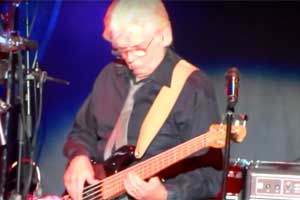
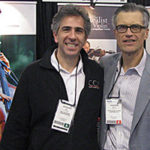
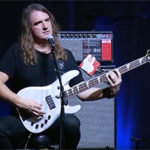
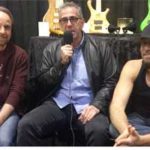
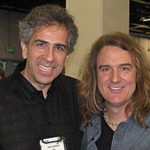

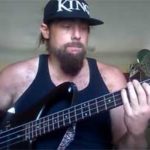

I love this band the original player David H.
He’s so good at the guitar and I really liked him as a young guitarist.
You could see he put a lot of love in the way he plays young or older.
I love all your music.
God bless you all.
I have loved Toto right from the beginning. I know David’s sister from when I lived in MO. I know she is singing as well. His Dad was a congressman. Glad the band is still going.